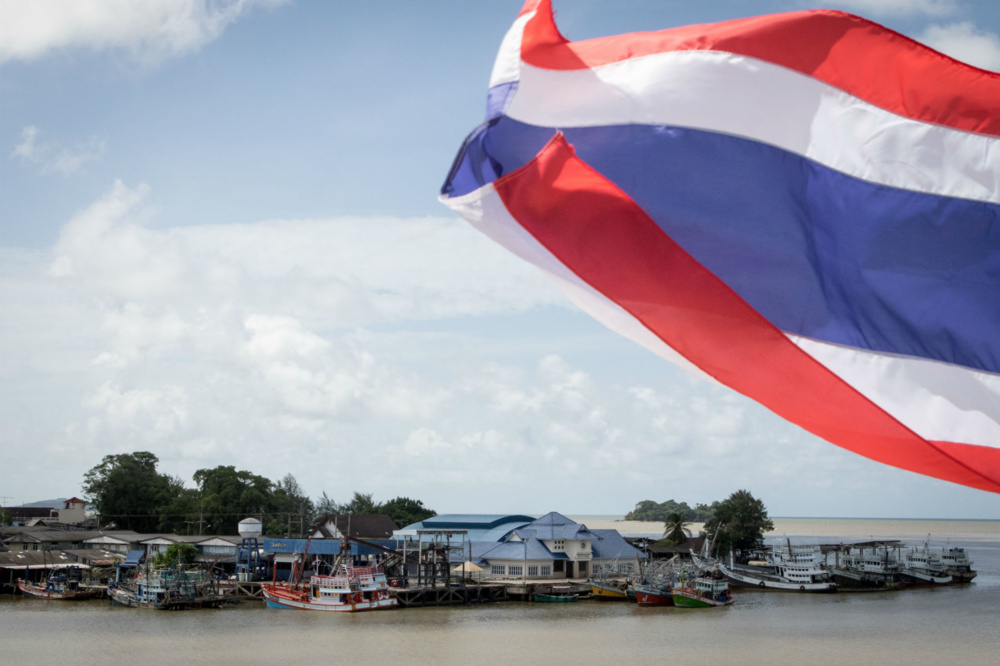
Thailand shows commitment to ending overfishing and human rights abuses
Thailand has demonstrated important positive progress in its commitment to securing sustainable, legal and ethical fisheries.
In a meeting with the Environmental Justice Foundation (EJF) the Thai Government has shown it is actively addressing illegal fishing and the associated human rights and labour abuses. Thailand has received a yellow card warning from the European Union in 2015 for its failure to sufficiently control and manage its fisheries.
EJF Executive Director Steve Trent recently met with Thailand’s Deputy Prime Minister General Prawit Wongsuwan to discuss the progress Thailand is making as well as the additional measures needed in order to ensure the success of reforms.
Since 2013 EJF has been working to expose and challenge the severe human rights abuses in Thailand’s seafood sector. Our investigations on land and at sea documented the widespread human trafficking, violence and slavery onboard of the fishing vessels. EJF has now observed first-hand the progress Thailand is making. Positive developments are clear in several key areas of reform. This includes the development of a new legislative framework to establish a comprehensive monitoring and inspection regime.
It was also clear that there is a strong commitment to ensuring International Labour Organisation (ILO) standards are followed. If appropriately adopted and enforced, this will go a long way to ensuring the rights of all workers are upheld.
Steve Trent, EJF Executive Director said:
‘Thailand has shown strong commitments to developing a sustainable fishing industry and addressing human rights issues. If the current efforts and commitments continue, with further reforms also secured, Thailand has the potential to become a role model in South East Asia and beyond.’
EJF recommendations for further reforms required include:
Signing, ratifying and implementing three key International Labour Organisation (ILO) conventions to protect all Thai and non-Thai workers in fisheries, the seafood sector and beyond
Setting sustainable fishing limits based on scientific advice and a precautionary approach
Begin a system of decommissioning fishing boats in order to tackle overcapacity in the fishing fleet that is driving the abuse and exploitation
Introduce digital, centralised monitoring systems for vessel, catch and crew
Ensure that corruption, illegal fishing and human trafficking violations are adequately addressed and victims protected
Thailand is committed to securing fully sustainable, legal and ethical fisheries and fulfilling its regional and global leadership role. EJF will continue working with and supporting the Thai Government to implement and secure the remaining necessary changes.
Find out about EJF’s work around the world fighting illegal overfishing and human rights abuses.
You can support EJF by donating to our campaigns, following us, or signing up to receive regular updates.
Official statement released by EJF September 7th
On 16th August 2017, Environmental Justice Foundation (EJF) Executive Director Steve Trent met with Thailand’s Deputy Prime Minister General Prawit Wongsuwan in Bangkok to discuss the reforms by the Royal Thai Government (RTG) to address Illegal, Unreported and Unregulated (IUU) fishing and associated human trafficking and labour abuses. The RTG has demonstrated substantial political will to combat IUU and the associated human rights and labour abuses since the European Union’s yellow card was initiated in April 2015.
Informed by our discussions and by EJF’s first-hand observations on land and at-sea, positive progress is visible in several key areas of reform and EJF commended the progress and advances made.
The RTG has succeeded in introducing a new legislative framework for fisheries and established a wide-ranging monitoring and inspection regime that is undergoing continuous review and revision. With the ratification of International Labour Organisation (ILO) Convention C111 Discrimination (Employment and Occupation) 1958, it has taken another important step forward, while the commitment to ratify further ILO Conventions and specifically, C188, Work in Fishing Convention, 2007; C98 Right to Organise and Collective Bargaining, 1949 and; C87 Freedom of Association and Protection of the Right to Organise, 1948 would represent profoundly important, decisive, advances when secured.
Although gaps, inconsistencies and shortcomings are still present in policy, implementation and operational practice, EJF believes that if the current efforts and commitments are upheld and additional reforms secured, Thailand has a compelling opportunity to build and entrench a sustainable fisheries management regime and an associated labour rights framework that can be a role model for the region and beyond.
EJF considers additional reforms must include:
1. Signing, ratifying and implementing ILO Conventions C188, C87 and C98 to establish a labour standard at sea and eliminate barriers that increase the vulnerability of migrant workers
2. Calculating a transparent, science based, precautionary and independently verified Maximum Sustainable Yield (MSY), which will serve as the basis for any forthcoming fisheries and fleet reform
3. Developing a decommissioning plan of fishing vessels in line with MSY to remove over-capacity as one of the drivers of overfishing, IUU and the associated human trafficking
4. Introducing digitised, centralised, inter-agency and inter-operable data systems for vessel, fishing and crew data – combining catch, landing and licence documents, crew manifests and ship logs - to provide agencies with actionable and fixed data points to identify high-risk areas and effectively address violations
5. Ensuring effective enforcement and prosecution of IUU and trafficking violations to protect victims, sanction perpetrators, combat official corruption and provide a credible deterrent
EJF pledges to support these reforms in order to assist the RTG in securing fully sustainable, legal and ethical fisheries for Thailand and in fulfilling its regional and global leadership role.
SIGN UP FOR OUR EMAILS AND STAY UP TO DATE WITH EJF